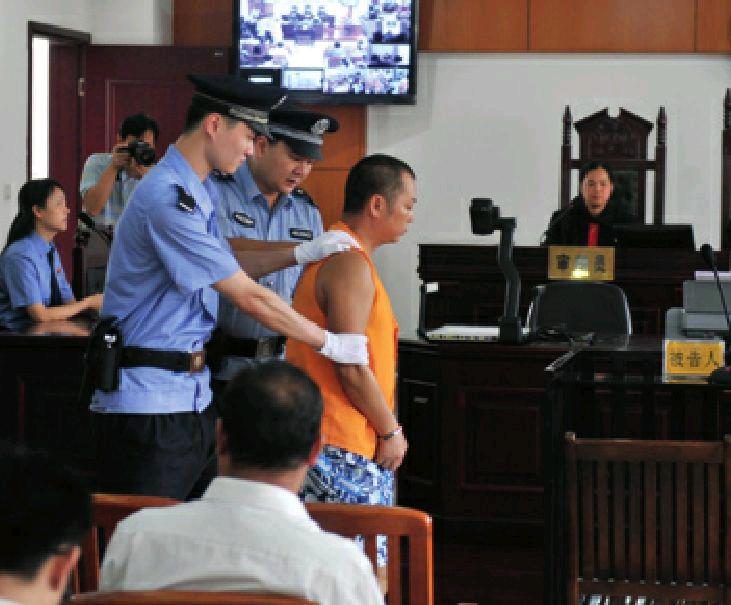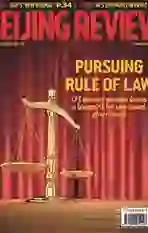Whittling Down Pollution
2014-11-10ByTangYuankai
By+Tang+Yuankai
On October 1, the Supreme Peoples Court (SPC) began to solicit feedback on an interpretation it published on adjudicating environment-related civil public interest lawsuits.
The 34-article document is an interpretation of the application of several environment-related laws, including the Environment Protection Law adopted by the National Peoples Congress on April 24, and will go into effect in January 2015. The document covers such topics as the requirements for prosecution, burden of proof, and liabilities.
In recent years, as Chinas economy grows by leaps and bounds, the country also faces serious resource constraints, exacerbating environmental pollution and ecological degradation, which jeopardizes the general populaces health and the sustainability of social and economic development.
This June, the Ministry of Environmental Protection (MEP) released the 2013 Report on the State of the Environment in China. The report shows that only 4.1 percent of the 74 cities that applied the new ambient air quality standards (GB3095-2012) reported good air quality. Among the other 256 cities that still use old standards, 69.5 percent met requirements.
Among the state-controlled monitoring stations of 10 major freshwater sources, 9 percent reported water quality worse than Grade V. On the scale, water of the highest quality is rated as Grade I, with Grade III and above considered fit to drink, to swim in and for daily household use.
Of the 4,778 monitoring spots for groundwater, 59.6 percent reported poor or extremely poor water quality.
In addition, another report issued jointly by the MEP and the Ministry of Land and Resources in April showed that about 16.1 percent of the countrys soil is polluted.
Moreover, environmental problems have given rise to more and more public disputes and protests, undermining social stability.
While people are aware of environmental rights protection, it is not easy to file environmental cases with the courts. Ma Yong, Deputy Director of the Environment Law Service Center of All-China Environment Federation, told Xinhua News Agency that, last year, the federation brought eight environment public interest litigations to courts, but none of the cases were accepted.
Environmental disputes are different from other disputes, said Lu Zhongmei, President of Hubei University of Economics who has done more than 30 years of research in environment laws. For instance, in environmental cases, the perpetrators are difficult to identify, damages are often not immediately seen, the cause-and-effect relations are hard to establish. These factors make it more difficult to bring environmental disputes to courts.
From 2011 to 2013, every year, an average of about 30,000 environment related criminal, civil and administrative cases were accepted and heard by courts across the country, according to Zheng Xuelin, President of the Environment and Resource Tribunal of the SPC. In contrast, every year, courts in China hear more than 10 million other types of cases in total every year, Zheng said.
Many environment and resource-related cases cannot enter the litigation process, Zheng said.
To facilitate the trial of environmental cases, environmental tribunals have been established in China. The first environmental tribunal was set up in 2007 in Qingzhen, southwest Chinas Guizhou Province.
So far, 134 environmental tribunals have been set up in 16 provincial-level administrative regions across the country, said Sun Jungong, spokesperson of the SPC on July 3. On that day, the Environment and Resource Tribunal of the SPC was set up.
The tribunals duties include hearing civil cases involving pollution, exploitation of natural resources and conservation of natural environments such as forests and rivers, and hearing appeal cases forwarded from lower courts, supervising the trial of environmental cases at lower courts and drafting judicial explanations about such cases, Sun said.
The tribunal is also expected to set the standards for trials of environmental cases, guide the work of lower courts and conduct research and draft relevant legal interpretations, Sun explained.
Positive roles
The establishment of special environmen- tal and resource courts will facilitate the appropriate application of relevant laws, standardize judicial adjudication and protect peoples environment rights, Sun said. They also help nurture respect for nature and enhance awareness of environmental protection, he said.
Since its inception in 2007, the environment tribunal on average adjudicates about 10 cases every month, Luo Guangqian, head of the Ecological Protection Tribunal of Qingzhen Peoples Court, told Beijing Youth Daily.
In recent years, it hears on average of approximately 110 cases every year, and so far this year, the tribunal has already heard more than 50 cases, Luo said.
He said that 30 to 40 percent of the cases they handled this year are resource-related criminal cases such as illegal tree felling, farmland occupation and mining.
In addition, they have tried civil cases including public interest cases and cases filed by individuals whose legitimate rights and interests have been infringed upon by polluting companies, he said.
They have also heard administrative cases, most of which involve administrative organizations requesting the court to enforce the punishments they have imposed on polluters, according to Luo.
“In all the public interest litigations we handled, the defendants have won,” Luo said. Some of the cases were settled through trials, and some through mediation, he added.
Speaking of the Environment and Resource Tribunal of the SPC, Luo said that its main role is to conduct legal research and guide the work of lower courts, whereas specific cases should still be tried by lower courts.
Luos points were echoed by professor Lu, who believes that the environmental tribunal of the SPC can guide grassroots environment tribunals by producing more detailed judicial interpretations and publishing typical cases. Right after it was set up, the tribunal published nine typical environmental cases.
“Because of the lack of rules to follow, lower courts are not sure what cases to hear, and worry whether they will offend local governments. Now the environmental tribunal of the SPC can make the rules,” said Wang Canfa, a professor in China University of Political Science and Law and one of the proponents of environmental and resource tribunals.
Adjudication of environmental cases needs special expertise, including knowledge of very complicated nature sciences, special skills to collect evidence and infer causal relations, said Zhao Huiyu, an associate professor with Shanghai Jiaotong University.
There are few university graduates who are well versed in environmental sciences and laws to serve in environmental tribunals in cities such as Guiyang, capital of Guizhou Province, said Fang Kun, Zhaos colleague.
Wang said that delivering training on environment laws should be one of the priorities of the environmental tribunal of the SPC.
He also suggested deepening reform of the judicial system, for instance, setting up courts that have trans-regional jurisdiction because environmental problems are usually trans-regional, and carrying out reforms to make it easier to file environmental lawsuits.
Clearing obstacles
Due to difficulties for the public to file environment cases, many environmental tribunals are running under capacity.
The general public are reluctant to file environmental cases because such cases are likely to be rejected by courts, and even if they are accepted, it usually takes a long time for courts to reach their ruling, and the indemnities they can get sometimes are not enough to cover litigation costs, said Ma Jun, a well-known environmental activist and Director of the Institute of Public and Environmental Affairs.
“To enhance adjudication of environmental and resource related cases, we should start from facilitating environmental public interest litigation,” said Xi Xiaoming, Vice President of the SPC on May 29 at a seminar.
Previously, environmental organizations or parties not directly victimized were not eligible to fine public interest lawsuits. In recent years, laws have been amended to give them the legal standing to sue on behalf of victims.
The amended civil procedure law that went into force in early 2013 gives the green light to environmental public interest lawsuits. Article 55 grants the right to the authorities and relevant organizations prescribed by the law to bring lawsuits against acts which give rise to environmental pollution as well as acts harmful to the consumers legitimate interests.
The amended Environment Protection Law to be implemented next year also stipulates that social organizations that meet certain conditions may file public interests litigations against acts that pollute the environment, damage ecology, and harm the public interest. These social organizations must be registered with civil affairs administrations above city level, and have engaged in environmental protection activities for five consecutive years with no law-violation records.
In this May, the Ecological Protection Tribunal of Qingzhen Peoples Court accepted a cross-regional public interest litigation filed by All-China Environment Federation.
